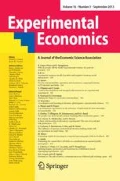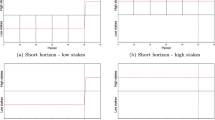Abstract
Coordination games with Pareto-ranked equilibria have attracted major attention over the past two decades. Two early path-breaking sets of experimental studies were widely interpreted as suggesting that coordination failure is a common phenomenon in the laboratory. We identify the major determinants that seem to affect the incidence, and/or emergence, of coordination failure in the lab and review critically the existing experimental studies on coordination games with Pareto-ranked equilibria since that early evidence emerged. We conclude that there are many ways to engineer coordination successes.
Similar content being viewed by others
References
Aumann, R. (1990). Nash equilibria are not self-enforcing. In J. J. Gabszewicz, J.-F. Richard, & L. A. Wolsey (Eds.), Economic decision making: Games, econometrics and optimization (pp. 123–150). Amsterdam: North-Holland.
Bangun, L., Chaudhuri, A., Prak, P., & Zhou, C. (2006). Common and almost common knowledge of credible assignments in a coordination game. Economics Bulletin, 3, 1–10.
Battalio, R. C., Samuelson, L., & Van Huyck, J. (2001). Optimization incentives and coordination failure in laboratory stag hunt games. Econometrica, 69, 749–764.
Berninghaus, S. K., & Ehrhart, K.-M. (1998). Time horizon and equilibrium selection in tacit coordination games: Experimental results. Journal of Economic Behavior and Organization, 37, 231–248.
Berninghaus, S. K., & Ehrhart, K.-M. (2001). Coordination and information: Recent experimental evidence. Economics Letters, 73, 345–351.
Blume, A., & Ortmann, A. (2007). The effects of costless pre-play communication: Experimental evidence from games with Pareto-ranked equilibria. Journal of Economic Theory, 132, 274–290.
Bornstein, G., Gneezy, U., & Nagel, R. (2002). The effect of intergroup competition on group coordination: An experimental study. Games and Economic Behavior, 41, 1–25.
Brandts, J., & Cooper, D. J. (2004). A change would do you good… An experimental study on how to overcome coordination failure in organizations. American Economic Review, 96, 669–693.
Brandts, J., & Cooper, D. J. (2006). Observability and overcoming coordination failure in organizations. Experimental Economics, 9, 407–423.
Burton, A., & Sefton, M. (2004). Risk, pre-play communication and equilibrium. Games and Economic Behavior, 46, 23–40.
Cachon, G. P., & Camerer, C. F. (1996). Loss-avoidance and forward induction in experimental coordination games. Quarterly Journal of Economics, 111, 165–194.
Camerer, C. (2003). Behavioral game theory: Experiments in strategic interaction. Princeton: Princeton University Press.
Charness, G. (2000). Self-serving cheap talk: A test of Aumann’s conjecture. Games and Economic Behavior, 33, 177–194.
Chaudhuri, A., & Bangun, L. (2007). Credible assignments in the minimum effort coordination game. Mimeo.
Chaudhuri, A., Schotter, A., & Sopher, B. (2005). Talking ourselves to efficiency: Coordination in inter-generational minimum effort games with private, almost common and common knowledge of advice. Mimeo.
Clark, K., & Sefton, M. (2001). Repetition and signalling: Experimental evidence from games with efficient equilibria. Economics Letters, 70, 357–362
Clark, K., Kay, S., & Sefton, M. (2001). When are Nash equilibria self-enforcing? An experimental analysis. International Journal of Game Theory, 29, 435–456.
Cooper, D. J. (2006). Are experienced managers experts at overcoming coordination failure. Advances in Economic Analysis & Policy, 6.2, Article 6 (50 pages).
Cooper, R., De Jong, D., Forsythe, R., & Ross, T. (1990). Selection criteria in coordination games: Some experimental results. American Economic Review, 80, 218–233.
Cooper, R., De Jong, D., Forsythe, R., & Ross, T. (1992). Communication in coordination games. Quarterly Journal of Economics, 107, 739–771.
Cowan, N. (2001). The magical number 4 in short-term memory: A reconsideration of mental storage capacity. Behavioral and Brain Sciences, 24, 87–185.
Davis, D., & Holt, C. A. (1993). Experimental economics. Princeton: Princeton University Press.
Devetag, G. (2005). Precedent transfer in coordination games: An experiment. Economics Letters, 89, 227–232.
Devetag, G., & Warglien, M. (2007). Playing the wrong game: An experimental analysis of relational complexity and strategic misrepresentation. Games and Economic Behavior (in press).
Dufwenberg, M., & Gneezy, U. (2005). Gender and coordination. In A. Rapoport, & R. Zwick (Eds.), Experimental business research (Vol. 3, pp. 253–262). Boston: Kluwer Academic.
Duffy, J., & Feltovich, N. (2002). Do actions speak louder than words? Observation vs. cheap talk as coordination devices. Games and Economic Behavior, 39, 1–27.
Duffy, J., & Feltovich, N. (2006). Words, deeds and lies: Strategic behavior in games with multiple signals. Review of Economic Studies, 73(3), 669–688.
Feltovich, N., Iwasaki, A., & Oda, S. H. (2005). Payoff levels, equilibrium selection, and learning: An experimental study of the stag hunt. Mimeo.
Goeree, J. K., & Holt, C. A. (2005). An experimental study of costly coordination. Games and Economic Behavior, 51, 349–364.
Harsanyi, J., & Selten, R. (1988). A general theory of equilibrium selection in games. Cambridge: MIT Press.
Heinemann, F., Nagel, R., & Ockenfels, P. (2004). Measuring strategic uncertainty in coordination games. Mimeo.
Huck, S., Norman, H., & Oechsler, J. (2004). Two are few and four are many: Number effects in experimental laboratories. Journal of Economic Behavior and Organization, 53, 435–446.
Johnson, E. J., Camerer, C., Sen, S., & Rymon, T. (2002). Detecting failures of backward induction: Monitoring information search in sequential bargaining. Journal of Economic Theory, 104, 16–47.
Knez, M., & Camerer, C. (1994). Creating expectational assets in the laboratory: Coordination in ‘weakest-link’ games. Strategic Management Journal, 15, 101–119.
Knez, M., & Camerer, C. (2000). Increasing cooperation in prisoner’s dilemmas by establishing a precedent of efficiency in coordination games. Organizational Behavior and Human Decision Processes, 82, 194–216.
Kreps, D. M. (1990). Clarendon lectures: Game theory and economic modelling. Oxford: Oxford University Press.
Lewis, D. (1969). Convention: A philosophical study. Cambridge: Harvard University Press.
List, J. A. (2004). Neoclassical theory versus prospect theory: Evidence from the marketplace. Econometrica, 72, 615–625.
List, J. A. (2006). The behavioralist meets the market: Measuring social preferences and reputation effects in actual transactions. Journal of Political Economy, 114(1), 1–37.
Plott, C. R., & Zeiler, K. (2005). The willingness to pay-willingness to accept gap, the ‘endowment effect’, subject misconceptions and experimental procedures for eliciting valuations. American Economic Review, 95, 530–545.
Rankin, F., Van Huyck, J. B., & Battalio, R. C. (2000). Strategic similarity and emergence of conventions: Evidence from payoff perturbed stag hunt games. Games and Economic Behavior, 32, 315–337.
Rydval, O., & Ortmann, A. (2005). Loss avoidance as selection principle: Evidence from simple stag-hunt games. Economics Letters, 88, 101–107.
Schmidt, D., Shupp, R., Walker, J. M., & Ostrom, E. (2003). Playing safe in coordination games: The role of risk dominance, payoff dominance, social history, and reputation. Games and Economic Behavior, 42, 281–299.
Selten, R. (1973). A simple model of imperfect competition, where four are few and six are many. International Journal of Game Theory, 2, 141–201.
Van Huyck, J. B., Battalio, R. C., & Beil, R. O. (1990). Tacit coordination games, strategic uncertainty, and coordination failure. The American Economic Review, 80, 234–248.
Van Huyck, J. B., Battalio, R. C., & Beil, R. O. (1991). Strategic uncertainty, equilibrium selection, and coordination failure in average opinion games. The Quarterly Journal of Economics, 106, 885–911.
Van Huyck, J. B., Gillette, A., & Battalio, R. C. (1992). Credible assignments in coordination games. Games and Economic Behavior, 4, 606–626.
Van Huyck, J. B., Battalio, R. C., & Beil, R. O. (1993). Asset markets as an equilibrium selection mechanism: Coordination failure, game form auctions, and tacit communication. Games and Economic Behavior, 5, 485–504.
Van Huyck, J. B., Cook, J. P., & Battalio, R. C. (1997). Adaptive behavior and coordination failure. Journal of Economic Behavior and Organization, 32, 483–503.
Van Huyck, J. B., Battalio, R. C., & Rankin, F. W. (2007). Evidence on learning in coordination games. Experimental Economics, this issue.
Weber, R. (2006). Managing growth to achieve efficient coordination in large groups. American Economic Review, 96(1), 114–126.
Weber, R., Camerer, C., Rottenstreich, Y., & Knez, M. (2001). The illusion of leadership: Misattribution of cause in coordination games. Organization Science, 12, 582–598.
Wilcox, N. T. (1993). Lottery choice: Incentives, complexity and decision time. Economic Journal, 103, 1397–1417.
Author information
Authors and Affiliations
Corresponding author
Rights and permissions
About this article
Cite this article
Devetag, G., Ortmann, A. When and why? A critical survey on coordination failure in the laboratory. Exp Econ 10, 331–344 (2007). https://doi.org/10.1007/s10683-007-9178-9
Published:
Issue Date:
DOI: https://doi.org/10.1007/s10683-007-9178-9
Keywords
- Coordination games
- Pareto-ranked equilibria
- Payoff-asymmetric equilibria
- Stag-hunt games
- Optimization incentives
- Robustness
- Coordination
- Coordination failure




